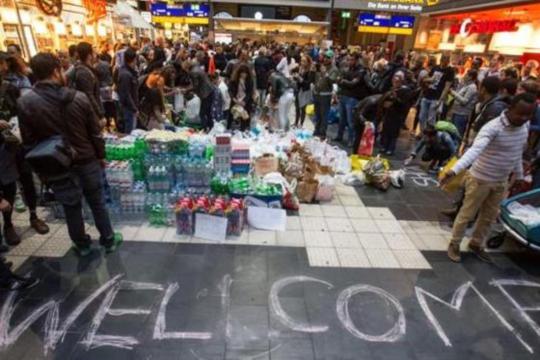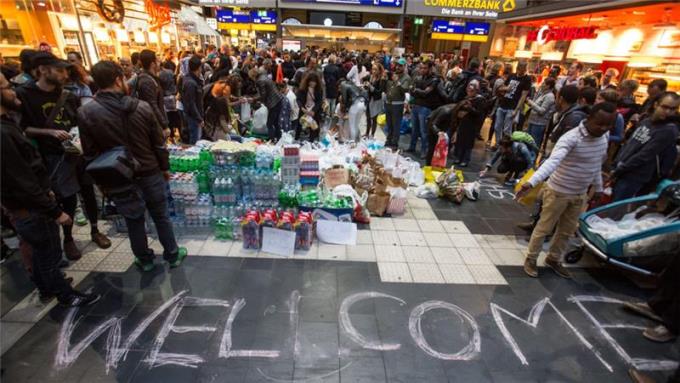
 |
| As the refugee crisis unfolds, Germany prepares for vast social challenges of accepting so many newcomers [EPA] |
|
Abstract This paper will discuss the reasons for Germany’s overwhelming overtures to the current crisis. It will argue that the leading political and financial role Germany plays in Europe is the key reason. The paper will also look at and link the role of Germany in the Second World War and the subsequent refugee crisis in trying to further the argument. Finally, it will look at the moral imperative of Germany. Could this be an attempt by Germany to attempt to rectify political mistakes in the past? |
Introduction
The majority of the Syrian refugees who are at present leaving Syria for Europe are middle class Sunni Muslims who have endured four years of severe civil war. According to figures from Sweden, forty per cent of the Syrians arriving there have higher education or upper-level secondary education, in comparison, for example, with only twenty per cent of the Afghans. Many of those who are currently departing from Syria had homes and jobs there. After four years of war, many Syrians, even those whose circumstances have continued to be relatively safe, want a better standard of living and access to education for themselves or their children(1).
Turkey hosts the largest number of Syrian refugees and continues to absorb more. According to CNN, Turkey has nearly 2 million refugees, followed by Lebanon with 1.1 million. From the onset of Syria’s civil war, Turkey has dealt efficiently with the refugee crisis, providing amenities for the refugees and organising schools in the refugee camps, while thousands of Turkish relief organisations strive to improve the refugees’ lives. The European Union has recently approved a financial relief package to assist Turkey to deal with the refugee crisis.
Britain, however, whose well-documented political mistakes have in the past have made their contribution to the ongoing political instability in the Middle East, has shown little leadership in efforts to resolve the crisis. Instead, it has adopted a highly conservative stance towards the current situation in relation to the refugees and a similar attitude towards migrants in general. The British foreign secretary, Phillip Hammond, in a recent interview, portrayed African migrants as “marauders”, who would hasten the collapse of European civilisation(2).
Greece and Hungary have both been hard on immigrants who are seeking to pass through their territory to the hinterlands of Europe. Both countries lie on the European Union’s frontiers and have therefore embraced a more stringent approach towards refugees arriving in Europe. Their attitude has apparently been adopted at the behest of other European Union countries, although this has never been openly admitted. The treatment of the refugees by the authorities of each of these two countries has revealed a different face of Europe, with hundreds of people stranded for hours without amenities, water and shelter. Hungary’s contention is that its frontier is the first line of defence against potential abuses of the European Union’s Schengen visa regime, where admission to one country that is a party to the Schengen agreement allows entry to all countries that form part of the Schengen region. Should the checks on the Hungarian border fail to control the flow of refugees into Europe, this might imply the end of the Schengen visa regime as it stands, which could in turn give rise to heightened popular sentiments in certain states in favour of secession from the European Union. In addition, the collapse of the Schengen visa regime could lead to the reintroduction of stricter border controls between European states, which in turn would affect the free movement of people, goods and services. All of these factors in combination could conduce to the collapse of the European Union, already a precarious enterprise.
What is the rationale behind the welcoming of refugees into Germany?
The German Chancellor, Angela Merkel, has recently come under intense scrutiny as hundreds of thousands of Syrian refugees have entered Europe. While most European countries have adopted a sceptical attitude towards the refugees, with some displaying actual hostility, Angela Merkel and the German nation have welcomed them. Germany has gone further than all other countries, announcing that it will absorb half a million people in a year. According to the United Nations (UN) a record figure of 218,000 people crossed the Mediterranean in October 2015. Why is Germany welcoming the Syrian refugees at a time when the remainder of Europe seems to be dragging its feet in addressing the crisis?
First, Germany is the principal sponsor of the European Union project. Germany’s economic success has resulted in it assuming multiple social, political and economic responsibilities within Europe. Just one of the many tests the European Union has faced was the Greek financial crisis, where arguably German leadership averted a Greek exit from the Eurozone. It is therefore natural that Germany should become primarily involved in a crisis of this magnitude(3).
Second, the German population is ageing, at a time when the country’s growing economy continues to require an active workforce. Most Germans, and especially Chancellor Merkel herself, are aware of this, whence the German attitude towards the refugees. The majority of those Syrians who have shown the ability to walk hundreds of kilometres to their various destinations of choice in Europe are young and fairly well-educated. The absorption of young Syrians, educated to a reasonable standard and with functional English, will certainly contribute to the replenishment of the declining German workforce. The warm welcome given by Chancellor Merkel to the Syrian refugees has even been regarded as something of a demographic coup, with motivated, healthy and educated people invited to join an ageing society, thus giving it a much-needed youthful boost. Many of the newly arrived Syrians in Munich were in their 20s and 30s and displayed an impressive range of qualifications and aspirations, often combined with competence in European languages(4).
Understanding the relevance of WWII on the Syrian refugee crisis
It cannot be denied that the reckless actions of Germany during the Second World War also contributed to the current political crisis in the Middle East. The war itself and its aftermath created the first refugee crisis in post-1945 period, which was also the largest the world has known, with multiple migrations in several directions. Some of these refugees were European Jews who migrated to Palestine and established the state of Israel, whose creation led to the reconfiguration of the map of the Middle East and the borders in the region.
Most Palestinians were forced to leave their land in Palestine during what became known as the “Nakba” (the “Catastrophe”). In the aftermath of the “Nakba”, the war between Israel and the coalition of Arab nations led to the departure of further waves of thousands of Palestinian refugees into neighbouring Arab countries, especially Lebanon, Jordan and Syria. What ensued from this war was an Arab solidarity whose exclusive purpose was to defeat the state of Israel, which was seen as the embodiment of all that was evil in the region. This excessive preoccupation with a single political issue, together with the concomitant neglect of other regional political exigencies, gave rise to a political mentality in the region where the supremacy of strong rulers became the norm. Subsequently, Arab rulers behaved with increasing brutality towards their peoples until the onset of the popular uprisings in Tunisia in December 2010. The Syrian refugee crisis could be linked to this lack of foresight on the part of established Arab governments. What began as a peaceful protest culminated in an apparently endless conflict which has killed hundreds of thousands of people while displacing millions.
Finally, many Germans remain stigmatized by the involvement of Germany in the Second World War. In the post-War period, Germany took a central role in the process of “denationalizing” Europe and in the promotion of a pan-European culture conducive to economic growth and socio-political development. In terms of foreign policy, Germany rebuilt trust by embracing the policies of integration and Europeanization of the states of Western Europe. As the state destined to be the demographic and economic power at the heart of Europe, Germany should never again become a threat to the continent of Europe or to itself(5). Young Germans often talk of the perpetual guilt of being German, and it is no secret that many Germans see, within this refugee crisis, the opportunity for change. Although there are some opposed to the acceptance of refugees, the majority of Germans seem to be accepting the idea. And while sporadic anti-migrant protests have been seen across Germany recently, many locals are finding original and heart-warming ways to welcome refugees. The generosity of the German people has been on display, in the train stations where refugees have arrived, in the classrooms where their children are being taught, and in the kitchens where volunteers are feeding those left destitute(6). This is a watershed moment for the Germans, and it may come to chart the direction of a different political trajectory for future generations.
Conclusion
Europe’s historical complicity in the Middle East continues to affect the geopolitics of the region and its social and -economic stability in that region. The Syrian war has continued unabated for the past four years, hundreds of thousands of civilians have been killed and millions more displaced. The sudden onset of mass migration of Syrian refugees to Europe has compelled many European countries to reconsider their involvement in future global conflicts. An additional phenomenon is that some of the responses on the part of some countries in their attempts to cope with the crisis have exposed the growing right-wing within the European political establishment.
Many theories have been advanced that seek to explain what triggered the sudden mass migration of Syrian refugees to Europe, which has escalated to crisis proportions. Some attribute it to the news of the imminent bombardment of Syria by Russia. Up to 100,000 refugees have fled the Syrian city of Aleppo and its surrounding areas since the beginning of Russian attacks(7). Awareness of the weakness of border control systems at the European frontier, particularly in Greece, encouraged thousands of refugees to make their bid to enter Europe. Another issue that has played a role in triggering the current crisis has been widespread disillusionment over the prospect that the war can be halted in the foreseeable future. These and other salient factors in combination, among others, all continue to influence the flow of refugees to Europe. Given all these factors, however, nothing has more clearly encouraged the movement of refugees than the statements made by the German Chancellor Angela Merkel in the early days of the crisis that Germany would be willing to host refugees.
________________________________________
Copyright © 2015 Al Jazeera Centre for Studies, All rights reserved.
*Thembisa Fakude is a Researcher at Al Jazeera Centre for Studies.
References
1. “Time to go, who is leaving for Europe and why?” Economist, 26 Sept. 2015, http://www.economist.com/news/middle-east-and-africa/21667953-who-leaving-europe-and-why-time-go , (accessed 01 Nov. 2015).
2. Patrick Kingsley, The Guardian, “10 Truths about the migrant crisis”, 10 Aug. 2015, http://www.theguardian.com/uk-news/2015/aug/10/10-truths-about-europes-refugee-crisis , (accessed 10 Aug. 2015).
3. Michael Martinez, CNN, “Syrian Refugees: which countries welcome them, which ones don’t”, 10 Sept. 2015, http://edition.cnn.com/2015/09/09/world/welcome-syrian-refugees-countries/ , (accessed 10 Sept. 2015).
4. Sophie Hardach, “Middle-class Syrian refugees start back at square one in Germany”, Al Jazeera America, 02 October 2015, http://america.aljazeera.com/articles/2015/10/2/syrias-battered-middle-class-hopes-for-a-fresh-start-in-germany.html , (accessed 02 October 2015).
5. Joschka Fischer, “The return of the ugly German”, Project Syndicate, 23 July 2015, http://www.project-syndicate.org/commentary/return-of-the-ugly-german-by-joschka-fischer-2015-07 , (accessed 23 July 2015).
6. Louise Dewast and Asthaa Chaturvedi, “Refugee crisis: innovative ways Germans are welcoming them”, ABC News, 08 Sept. 2015, http://abcnews.go.com/International/refugee-crisis-germans-welcoming/story?id=33589179 , (accessed 08 Sept. 2008).
7. Suzanne Lynch, Irish Times, 28 Oct. 2015, http://www.irishtimes.com/news/world/europe/russian-attacks-trigger-refugee-exodus-from-syria-1.2408000 , (accessed 01 Nov 2015).
